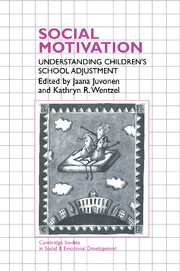Book contents
- Frontmatter
- Contents
- Contributors
- Preface
- Foreword
- 1 Introduction: New perspectives on motivation at school
- Part I Social motivation: Perspectives on self
- 2 Teacher and classmate influences on scholastic motivation, self-esteem, and level of voice in adolescents
- 3 Self-presentation tactics promoting teacher and peer approval: The function of excuses and other clever explanations
- 4 Social self-discrepancy: A theory relating peer relations problems and school maladjustment
- 5 Motivational approaches to aggression within the context of peer relationships
- 6 Motivational opportunities and obstacles associated with social responsibility and caring behavior in school contexts
- 7 Modeling and self-efficacy influences on children's development of self-regulation
- 8 Social motivation: Goals and social-cognitive processes. A comment
- Part II Social motivation: Perspectives on relationships
- Author index
- Subject index
7 - Modeling and self-efficacy influences on children's development of self-regulation
Published online by Cambridge University Press: 22 October 2009
- Frontmatter
- Contents
- Contributors
- Preface
- Foreword
- 1 Introduction: New perspectives on motivation at school
- Part I Social motivation: Perspectives on self
- 2 Teacher and classmate influences on scholastic motivation, self-esteem, and level of voice in adolescents
- 3 Self-presentation tactics promoting teacher and peer approval: The function of excuses and other clever explanations
- 4 Social self-discrepancy: A theory relating peer relations problems and school maladjustment
- 5 Motivational approaches to aggression within the context of peer relationships
- 6 Motivational opportunities and obstacles associated with social responsibility and caring behavior in school contexts
- 7 Modeling and self-efficacy influences on children's development of self-regulation
- 8 Social motivation: Goals and social-cognitive processes. A comment
- Part II Social motivation: Perspectives on relationships
- Author index
- Subject index
Summary
An essential feature of children's adjustment to school is their development of academically-related self-regulation and motivation. The question of how children acquire and internalize adult levels of self-regulatory competence and motivation has fascinated scholars since the ancient Greeks. Although philosophers, sociologists, and anthropologists have long emphasized the importance of socialization influences, until recently there has been relatively little detailed information about how such influences affect children's self-regulatory development. Since the late 1950s, researchers in the social learning tradition (Bandura & Walters, 1963) have hypothesized that children's exposure to socializing agents, especially adult or peer models, influences their behavioral and cognitive development (e.g., formation of concepts, attitudes, preferences, standards for self-reward and self-punishment). They found extensive evidence that children readily induce and transfer concepts that underlie modeling sequences (Rosenthal & Zimmerman, 1978; Zimmerman & Rosenthal, 1974).
In recent years, social cognitive theorists shifted their attention to adolescents' internalization of self-regulatory competence and studied how youngsters learn to function independently from socializing agents in an adaptive, generative, and creative manner. Bandura (1986) emphasized the importance of a number of specific self-regulatory processes. Self-regulation refers to processes students use to activate and sustain cognitions, behaviors, and affects, which are oriented toward the attainment of goals (Zimmerman, 1989, 1990). Academic self-regulatory processes include planning and managing time; attending to and concentrating on instruction; organizing, rehearsing, and coding information strategically; establishing a productive work environment; and using social resources effectively.
- Type
- Chapter
- Information
- Social MotivationUnderstanding Children's School Adjustment, pp. 154 - 180Publisher: Cambridge University PressPrint publication year: 1996
- 29
- Cited by



